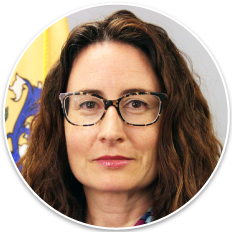Better serving people who are dually eligible for both Medicare and Medicaid is complex, but a key priority for many Medicaid agencies. This episode of the Medicaid Leadership Exchange podcast explores the importance of integrating benefits for this population to create more person-centered care and services for members. It also highlights the power of designing integrated programs in partnership with members and their caregivers. The conversation features perspectives from Medicaid directors in New Jersey and Texas:
- Jennifer Langer Jacobs, Assistant Commissioner, Division of Medical Assistance & Health Services, New Jersey Department of Human Services
- Emily Zalkovsky, Chief Medicaid and CHIP Services Officer, Texas Health and Human Services Commission
The episode is hosted by Mark Larson, former Vermont Medicaid director and senior vice president, Leadership and Capacity Building, Center for Health Care Strategies (CHCS), and Jami Snyder, former Arizona and Texas Medicaid director and president and CEO, JSN Strategies.
Allow up to 20 seconds for audio playback to begin.
Featured in this episode:
 | Mark Larson, former Vermont Medicaid director and senior vice president, Leadership and Capacity Building, CHCS |  | Jami Snyder, former Arizona and Texas Medicaid director and president and CEO, JSN Strategies |
 | Jennifer Langer Jacobs, Assistant Commissioner, Division of Medical Assistance & Health Services, New Jersey Department of Human Services |  | Emily Zalkovsky, Chief Medicaid and CHIP Services Officer, Texas Health and Human Services Commission |
The Medicaid Leadership Exchange podcast explores priority topics for Medicaid leaders and is developed in partnership by the National Association of Medicaid Directors and CHCS through support from the Robert Wood Johnson Foundation. Visit the series page for additional episodes, or listen on Apple Podcasts, Spotify, Amazon Music, or wherever you subscribe to podcasts.
Support for this podcast was provided by the Robert Wood Johnson Foundation. The views expressed here do not necessarily reflect the views of the Foundation.




